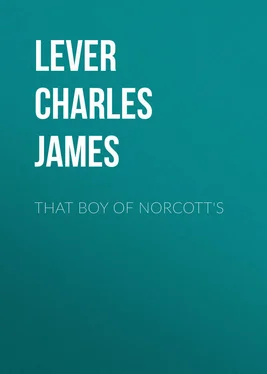Charles Lever - That Boy Of Norcott's
Здесь есть возможность читать онлайн «Charles Lever - That Boy Of Norcott's» — ознакомительный отрывок электронной книги совершенно бесплатно, а после прочтения отрывка купить полную версию. В некоторых случаях можно слушать аудио, скачать через торрент в формате fb2 и присутствует краткое содержание. Издательство: Иностранный паблик, Жанр: literature_19, foreign_antique, foreign_prose, на английском языке. Описание произведения, (предисловие) а так же отзывы посетителей доступны на портале библиотеки ЛибКат.
- Название:That Boy Of Norcott's
- Автор:
- Издательство:Иностранный паблик
- Жанр:
- Год:неизвестен
- ISBN:нет данных
- Рейтинг книги:4 / 5. Голосов: 1
-
Избранное:Добавить в избранное
- Отзывы:
-
Ваша оценка:
- 80
- 1
- 2
- 3
- 4
- 5
That Boy Of Norcott's: краткое содержание, описание и аннотация
Предлагаем к чтению аннотацию, описание, краткое содержание или предисловие (зависит от того, что написал сам автор книги «That Boy Of Norcott's»). Если вы не нашли необходимую информацию о книге — напишите в комментариях, мы постараемся отыскать её.
That Boy Of Norcott's — читать онлайн ознакомительный отрывок
Ниже представлен текст книги, разбитый по страницам. Система сохранения места последней прочитанной страницы, позволяет с удобством читать онлайн бесплатно книгу «That Boy Of Norcott's», без необходимости каждый раз заново искать на чём Вы остановились. Поставьте закладку, и сможете в любой момент перейти на страницу, на которой закончили чтение.
Интервал:
Закладка:
“He’s a loutish boy,” said Cleremont to the Captain. “I ‘ll wager what you like they’ll not make a horseman of him.”
“Ecoles says he’s a confounded pedant,” said the other; “that he wanted to cap Horace with him at breakfast.”
“Poor Bob! that was n’t exactly his line; but he ‘d hold his own in Balzac or Fred Soulié.”
“Oh, now I see what Norcott was driving at when he said, ‘I wanted the stuff to make a gentleman, and they ‘ve sent me the germ of a school-usher.’ I said, ‘Send him to sea with me. I shall be afloat in March, and I ‘ll take him.’”
“Well, what answer did he make you?”
“It was n’t a civil one,” said the other, gruffly. “He said, ‘You misapprehend me, Hotham. A sea-captain is only a boatswain in epaulettes. I mean the boy to be a gentleman.’”
“And you bore that?”
“Yes. Just as well as you bore his telling you at dinner on Sunday last that a Legation secretary was a cross between an old lady and a clerk in the Customs.”
“A man who scatters impertinences broadcast is only known for the merits of his cook or his cellar.”
“Both of which are excellent.”
“Shall I send him in, sir?” asked George, as he patted the young horse and caressed him.
“Well, Eccles,” cried Hotham, as the tutor lounged lazily tip, “what do you say to the mount they ‘re going to put your pupil on?”
“I wish they ‘d wait a bit I shall not be ready for orders till next spring, and I ‘d rather they ‘d not break his neck before February or March.”
“Has Norcott promised you the presentation, Bob?”
“No. He can’t make up his mind whether he ‘ll give it to me or to a Plymouth Brother, or to that fellow that was taken up at Salford for blasphemy, and who happens to be in full orders.”
“With all his enmity to the Established Church, I think he might be satisfied with you,” said Cleremont.
“Very neat, and very polite too,” said Eccles; “but that this is the Palace of Truth, I might feel nettled.”
“Is it, by Jove?” cried Hotham. “Then it must be in the summer months, when the house is shut up. Who has got a strong cigar? These Cubans of Norcott’s have no flavor. It must be close on luncheon-time.”
“I can’t join you, for I ‘ve to go into town, and get my young bear trimmed, and his nails cut. ‘Make him presentable,’ Norcott said, and I ‘ve had easier tasks to do.”
So saying, Eccles moved off in one direction, while Hotham and Cleremont strolled away in another; and I was left to my own reflections, which were not few.
CHAPTER V. A FIRST DINNER-PARTY
I was made “presentable” in due time, and on the fifth day after my arrival made my appearance at the dinner-table. “Sit there, sir,” said my father, “opposite me.” And I was not sorry to perceive that an enormous vase with flowers effectually screened me from his sight. The post of honor thus accorded me was a sufficient intimation to my father’s guests how he intended me to be treated by them; and as they were without an exception all hangers-on and dependants, – men who dined badly or not at all when uninvited to his table, – they were marvellously quick in understanding that I was to be accepted as his heir, and, after himself, the person of most consideration there.
Besides the three individuals I have already mentioned, our party included two foreigners, – Baron Steinmetz, an aide-de-camp of the King, and an Italian duke, San Giovanni. The Duke sat on my father’s right, the Baron on mine. The conversation during dinner was in French, which I followed imperfectly, and was considerably relieved on discovering that the German spoke French with difficulty, and blundered over his genders as hopelessly as I should have done had I attempted to talk. “Ach Gott,” muttered he to himself in German, “when people were seeking for a common language, why did n’t they take one that all humanity could pronounce?”
“So meine ich auch, Herr Baron,” cried I; “I quite agree with you.”
He turned towards me with a look of-positive affection, on seeing I knew German, and we both began to talk together at once with freedom.
“What’s the boy saying?” cried my father, as he caught the sounds of some glib speech of mine. “Don’t let him bore you with his bad French, Steinmetz.”
“He is charming me with his admirable German,” said the Baron. “I can’t tell when I have met a more agreeable companion.”
This was, of course, a double flattery, for my German was very bad, and my knowledge on any subject no better; but the fact did not diminish the delight the praise afforded me.
“Do you know German, Digby?” asked my father.
“A little, – a very little, sir.”
“The fellow would say he knew Sanscrit if you asked him,” whispered Hotham to Eccles; but my sharp ears overheard him.
“Come, that’s better than I looked for,” said my father. “What do you say, Eccles? Is there stuff there?”
“Plenty, Sir Roger; enough and to spare. I count on Digby to do me great credit yet.”
“What career do you mean your son to follow?” asked the Italian, while he nodded to me over his wine-glass in most civil recognition.
“I’ll not make a sailor of him, like that sea-wolf yonder; nor a diplomatist, like my silent friend in the corner. Neither shall he be a soldier till British armies begin to do something better than hunt out illicit stills and protect process-servers.”
“A politician, perhaps?”
“Certainly not, sir. There ‘s no credit in belonging to a Parliament brought down to the meridian of soap-boilers and bankrupt bill-brokers.”
“There’s the Church, Sir Roger,” chimed in Eccles.
“There’s the Pope’s Church, with some good prizes in the wheel; but your branch, Master Bob, is a small concern, and it is trembling, besides. No. I ‘ll make him none of these. It is in our vulgar passion for money-getting we throw our boys into this or that career in life, and we narrow to the stupid formula of some profession abilities that were meant for mankind. I mean Digby to deal with the world; and to fit him for the task, he shall learn as much of human nature as I can afford to teach him.”
“Ah, there’s great truth in that, very great truth; very wise and very original too,” were the comments that ran round the board.
Excited by this theme, and elated by his success, my father went on: —
“If you want a boy to ride, you don’t limit him to the quiet hackney that neither pulls nor shies, neither bolts nor plunges; and so, if you wish your son to know his fellow-men, you don’t keep him in a charmed circle of deans and archdeacons, but you throw him fearlessly into contact with old debauchees like Hotham, or abandoned scamps of the style of Cleremont,” – and here he had to wait till the laughter subsided to add, “and, last of all, you take care to provide him with a finishing tutor like Eccles.”
“I knew your turn was coming, Bob,” whispered Hotham; but still all laughed heartily, well satisfied to stand ridicule themselves if others were only pilloried with them.
When dinner was over, we sat about a quarter of an hour, not more, and then adjourned to coffee in a small room that seemed half boudoir, half conservatory. As I loitered about, having no one to speak to, I found myself at last in a little shrubbery, through which a sort of labyrinth meandered. It was a taste of the day revived from olden times, and amazed me much by its novelty. While I was puzzling myself to find out the path that led out of the entanglement, I heard a voice I knew at once to be Hotham’s, saying, —
“Look at that boy of Norcott’s: he’s not satisfied with the imbroglio within doors, but he must go out to mystify himself with another.”
Читать дальшеИнтервал:
Закладка:
Похожие книги на «That Boy Of Norcott's»
Представляем Вашему вниманию похожие книги на «That Boy Of Norcott's» списком для выбора. Мы отобрали схожую по названию и смыслу литературу в надежде предоставить читателям больше вариантов отыскать новые, интересные, ещё непрочитанные произведения.
Обсуждение, отзывы о книге «That Boy Of Norcott's» и просто собственные мнения читателей. Оставьте ваши комментарии, напишите, что Вы думаете о произведении, его смысле или главных героях. Укажите что конкретно понравилось, а что нет, и почему Вы так считаете.












